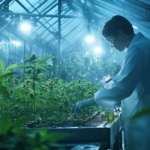JERUSALEM — Hebrew University of Jerusalem (HU) researchers, in partnership with Mariana Bioscience Ltd. in Israel, have successfully engineered a cannabis plant with higher levels of THC (tetrahydrocannabinol), and other medically-important substances.
The researchers successfully increased the levels of THC, the primary psychoactive component in cannabis, by nearly 17%, as well as the level of CBG (cannabigerol), often referred to as “the mother of all cannabinoids,” by nearly 25%.
The researchers in the laboratory of Professor Alexander (Sasha) Vainstein at the HU Robert H. Smith Faculty of Agriculture, Food and Environment, collaborated with and received funding from Mariana Bioscience Ltd., a global pioneer in the genetic cannabis research field. Vainstein’s team also increase the ratio of terpenes by 20-30%. Terpenes maximize the euphoric effect of cannabis.
The research team was seeking to intervene in the cannabis plant’s biochemical pathways to increase or decrease active substances production. For the first time, they succeeded by first manipulating a neutralized plant-based virus, so that it could not harm the plant., and then to express the genes that influence the production of active substances.
“This represents an innovative use of these tools, which were constructed using synthetic biology tools,” says Vainstein. “Next, we developed an innovative technology based on infection with an engineered virus to facilitate chemical reactions that increase the quantities of desired substances. In collaboration with Mariana Bioscience Ltd., we examined the infected plants and found that the levels of the substances in question had indeed risen.” This is the first time that researchers have succeeded in performing such a feat with cannabis plants.
Until now, there was no method to tailor strains to produce certain cannabis substances or alter the ratio between them. According to Vainstein, “these study results will be valuable both to industry—to increase the yield of active substances, and to medical researcher—to cultivate and develop new strains for medical cannabis users.”
More extensive experiments with the engineered plant are currently underway and should be available to cannabis industry leaders and medical research in the next few months.
There is a great deal of research activity currently aimed at identifying additional substances and medical treatments that can be derived from the cannabis plant, in addition to the more than 200 active ingredients that have already been identified.
About the Hebrew University of Jerusalem
The Hebrew University of Jerusalem is Israel’s leading academic and research institution. Serving 24,000 students from 80 countries, it produces a third of Israel’s civilian research and is ranked 12th worldwide in biotechnology patent filings and commercial development. Faculty and alumni of the Hebrew University have won eight Nobel Prizes and a Fields Medal. For more information about the Hebrew University, please visit http://new.huji.ac.il/en.
About American Friends of the Hebrew University
American Friends of the Hebrew University (AFHU) is a national, not-for-profit organization based in the United States. AFHU is headquartered in New York, and has seven regional offices working in close partnership with the Hebrew University of Jerusalem. AFHU provides supporters, Hebrew University alumni, and the public with stimulating programs and events, and organizes missions to Israel. The organization’s activities support scholarly and scientific achievement at HU, create scholarships, fund new facilities, and assist the University’s efforts to recruit outstanding new faculty.
For more information, please visit http://www.afhu.org.
Follow us on: Facebook | Linkedin | Twitter | Instagram | YouTube










